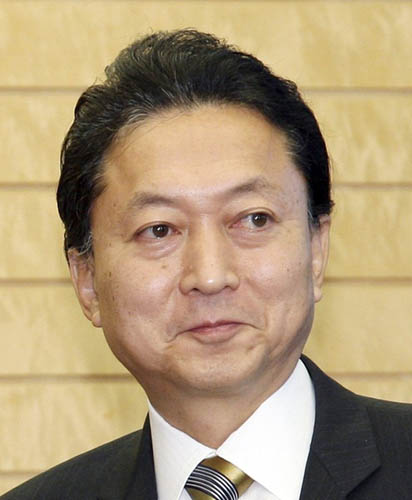Japan's former leader to visit Beijing
 0 Comment(s)
0 Comment(s) Print
Print E-mail China Daily, January 15, 2013
E-mail China Daily, January 15, 2013
Former Japanese prime minister Yukio Hatoyama is scheduled to arrive in Beijing on Tuesday for a four-day visit, a move analysts said will build a communication channel amid tension over the Diaoyu Islands.
 |
|
Former Japanese prime minister Yukio Hatoyama. [File Photo] |
The visit also comes against the backdrop of a diplomatic blitz by the government of Shinzo Abe, which observers said was aimed at isolating China.
The visit by Hatoyama, a prominent opposition party figure, comes just a month after the Liberal Democratic Party's landslide victory in December.
Hatoyama is visiting at the invitation of a Chinese non-governmental organization, sources said.
China Daily has learned that both Hatoyama and the NGO are keeping the visit low profile, but Hatoyama will meet with senior Chinese officials.
Hatoyama served as Japan's prime minister from September 2009 to June 2010, and he has been a frequent visitor to Beijing.
"Beijing is definitely expecting a prominent figure who can bridge both sides,'' said Yang Bojiang, a Japanese studies specialist at the Chinese Academy of Social Sciences.
Hatoyama, the first Democratic Party of Japan prime minister, championed the theme of an "East Asian Community" while in office.
He was a guest of Vice-President Xi Jinping and Vice-Premier Li Keqiang in 2012, and he stressed the importance of trust and exchanges between the two countries.
Ties between China and Japan were damaged in September after Tokyo illegally "purchased" part of the China's Diaoyu Islands.
The former Japanese premier has stated that he wants to discuss the importance of relations, Japan's NHK television said.
Although Hatoyama does not represent the Japanese Cabinet "it is an opportunity for Tokyo to deliver a message to Beijing'', said Liang Yunxiang, a professor of Japanese studies at Peking University.
Hatoyama has criticized the ruling party over the islands, but Japan's national interests remain his top priority, Liang added.
Yang, from the academy, predicted that Hatoyama may deliver a viewpoint that differs from Tokyo's official stance but it would be wrong to place too much hope on his visit.
Liang said that both governments already have diplomatic channels in place.





